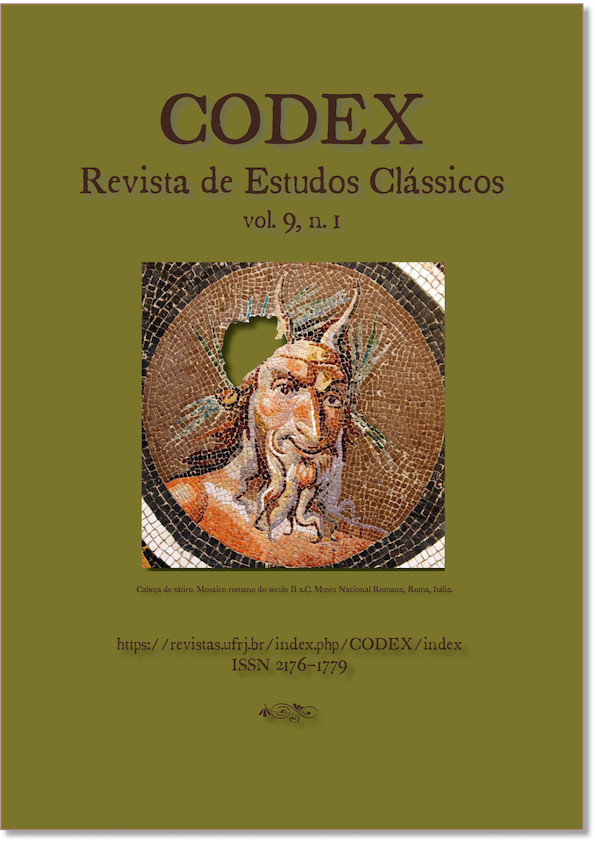God-sent misfortunes: sketching an anthropology of disease in Ancient Greece
DOI:
https://doi.org/10.25187/codex.v9i1.38138Keywords:
disease, divine justice, Ancient Greece, timé, hýbrisAbstract
Anchored in the materiality of the body, the socio-cultural construction of disease reveals natives anthropologies, the production of models of humanity at the heart of cultures. Notwithstanding the universal range of biological troubles affecting all humans throughout space and time, the ways of coping with and thinking about them, the practices in use to fight them, and the intersubjective relationships weaved around them are constructed at each cultural and historical specific situation. In a dialogue with studies in disease anthropology, this article investigates the dynamics of meaning underlying the representations of disease as a divine punishment in Ancient Greece, with special attention to Hesiod and Homer. It notes that god-sent diseases may be inscribed both in a specific instance of divine vendetta and in a reference to the fortuitous character of the diseases to which everybody is susceptible. None the less, both meanings link up the order of the body and the order of society. Since Greek divine anthropomorphism makes coincide human and divine, cult-expressed, social esteem in a single notion, timé, diseases can respond to divine justice not only as a punishment in a retributive dynamic, but also in a distributive one, ensuring the ontological distinction between mortals and immortals.
Downloads
References
ADKINS, Arthur. “Homeric Gods and the Values of Homeric Society”. Journal of Hellenic Studies, v. 92, 1972, p. 1-19.
AUGÉ, Marc; HERZLICH, Claudine (Dir.). Le sens du mal: Anthropologie, histoire, sociologie de la maladie. Paris, Éditions des archives contemporains, 1983.
BENVENISTE, Émile. Le vocabulaire des institutions indo-européennes. 2: pouvoir, droit, religion. Paris, Éditions de Minuit, 1969.
BRUIT-ZAIDMAN, Louise. Le commerce des dieux. Eusebeia: essai sur la pitié en Grèce ancienne. Paris, Éditions de la découverte, 2001.
CAIRNS, Douglas. “Hybris, Dishonour, and Thinking Big”. Journal of Hellenic Studies, v. 104, 1996, p. 1-32.
CALAME, Claude. Masques d’autorité: Fiction et pragmatique dans la poésie grecque antique. Paris, Les Belles Lettres, 2005.
CANTARELLA, Eva. Ithaque: De la vengeance d’Ulysse à la naissance du droit. Paris, Albin Michel, 1989.
CLAY, Jenny Strauss. Hesiod’s Cosmos. Cambridge, Cambridge University Press, 2003.
DEMONT, Paul. “Hubris, ‘outrage’, ‘anomie’, et ‘démesure’ de Gernet à Fisher”. In: BRILLET-DUBOIS; PARMENTIER, (Éd.) Philologia: mélanges offerts à Michel Cazevitz. Lyon, Maison de l’Orient et de la Méditerranée, 2006, p. 347-359.
FAINZANG, Sylvia. Pour une anthropologie de la maladie en France: Un regard africaniste. Paris, Éditions de l’EHESS, 1989.
FAUSTO, Carlos. “Banquete de gente: comensalidade e canibalismo na Amazônia”. Mana, v. 8, 2002, p. 7-44.
FAVRET-SAADA, Jeanne. Les mots, la mort, les sorts. Paris, Gallimard, 1997.
FISHER, Nick R. E. Hybris: A study in the values of honor and shame in Ancient Greece. Warminster, Aris & Phillips, 1992.
GERNET, Louis. Recherches sur le développement de la pensée juridique et morale en Grèce. Préface d’Eva Cantarella. Paris, Albin Michel, 2001.
GOOD, Byron. Comment faire de l’anthropologie médicale: Médecine, rationalité et vécu. Le Plessis-Robinson, Institut Synthélabo, 1998.
JUDET DE LA COMBE, Pierre. “La dernière ruse: Pandore dans la Théogonie”. In: JUDET DE LA COMBE, Pierre ; BLAISE, Fabienne ; ROUSSEAU, Philippe (Éd.). Le métier du mythe. Lectures d’Hésiode. Villeneuve d’Ascq, Presses Universitaires du Septentrion, 1996, p. 262-299.
KANNICHT, Richard. Tragicorum graecorum fragmenta. Vol. 5.1: Euripides. Göttingen, Vandenhoeck & Ruprecht, 2004.
KUDLIEN, Fridolf. “Early Greek Primitive Medicine”. Clio Medica, v. 3, 1968, p. 305-336.
LAPLANTINE, François. Anthropologie de la maladie. Paris, Payot, 1986.
LE BRETON, David. Anthropologie du corps et modernité. 5e. éd. Paris, PUF, 2008.
LÉVY, Edmond. “Aretè, timè, aidôs et nemesis: le modèle homérique”. Ktèma, v. 20, 1995, p. 177-221.
LIDDELL, Henry George, SCOTT, Robert, JONES, Henry Stuart. A Greek-English Lexicon – with a revised supplement. Oxford, Clarendon Press, 1996.
LLOYD, Geoffrey. In the Grip of Disease: Studies in Greek Imagination. Oxford, Oxford University Press, 2003.
LLOYD-JONES, Hugh. The Justice of Zeus. 2nd ed. Berkeley, University of California Press, 1983.
LORAUX, Nicole. “Le corps vulnérable d’Arès”, in MALAMOUD, Ch.; VERNANT, J. P. Corps des dieux. Paris, Gallimard, 1986, p. 465-492.
NAGY, Gregory. Greek Mythology and Poetics. Ithaca, Cornell University Press, 1990.
NAGY, Gregory. The Best of the Achaeans: Concepts of the Hero in Archaic Greek Poetry. Revised edition. Baltimore, The Johns Hopkins University Press, 1999.
NELSON, Stephanie. “Justice and Farming in the Works and Days” in LOUDEN, R. B.; SCHOLIMIER P. (Ed.) The Greeks and Us: Essays in Honor of Arthur Adkins. Chicago: University of Chicago Press, 1996, p. 17-36.
OLIVIER DE SARDAN, Jean-Pierre. “Les représentations des maladies: des modules?”, in JAFFRE, Y.; OLIVIER DE SARDAN, J. P. (Dir.) La construction sociale de la maladie: Les entités nosologiques populaires en Afrique de l’ouest. Paris, PUF, 1999, p. 15-40.
PARKER, Robert. Miasma: Pollution and Purification in Early Greek Religion. Oxford, Clarendon Press, 1983.
RUDHARDT, Jean. Notions fondamentales de la pensée religieuse et actes constitutifs du culte dans la Grèce classique. 2e éd. Paris, Picard, 1992.
VERNANT, Jean-Pierre. Oeuvres: religions, rationalités, politique. 2 vol. Paris: Éditions du Seuil, 2007.
VIVEIROS DE CASTRO, Eduardo. A inconstância da alma selvagem e outros ensaios de antropologia. São Paulo, Cosac & Naify, 2002.
WEST, Martin L. (Ed.). Iambi et elegi graeci. Oxford, Oxford University Press, 1971.
WILLI, Andreas. “Nosos and hosie: etymological and sociocultural observations on the concepts of disease and divine (dis)favour in ancient Greece”. Journal of Hellenic Studies, v. 128, 2008, p.153-171.
ZEMPLENI, Andras. “La ‘maladie’ et ses ‘causes’”. L’Ethnographie, v. 96-97, 1985, p. 13-44.
Downloads
Published
How to Cite
Issue
Section
License
This work is licensed under a Creative Commons Attribution-NonCommercial 4.0 International License.










